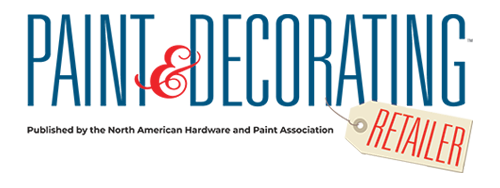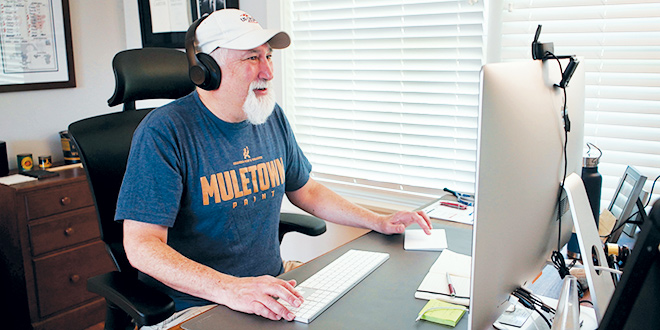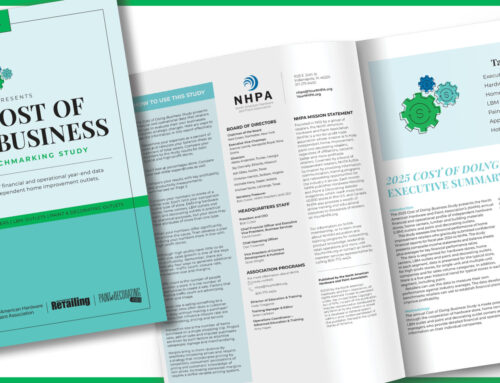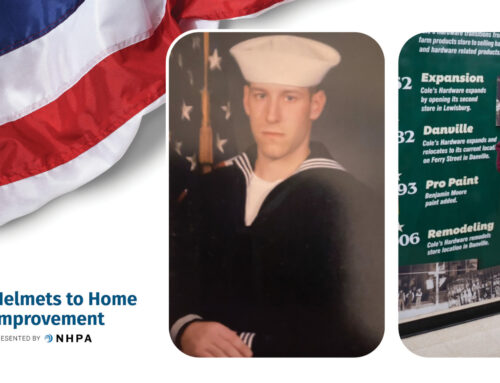The North American Hardware and Paint Association (NHPA) provides industry insights from Mark Lipton, a thought leader in the independent paint and hardware retailing channels. As a former independent paint retailer, Lipton shares his thoughts on the industry today. He also talks about his history of writing and creating content through his blog, podcast and vlog, and shares about the consultation services he provides to the industry. Read on to receive a sneak peak of episode 60 of the “Taking Care of Business” podcast, hosted by Dan Tratensek, chief operating officer and publisher of NHPA.
North American Hardware and Paint Association (NHPA): Tell us about your background in the home improvement industry.
Mark Lipton (ML): My great grandmother started my family’s first independent paint store, Tremont Paint, in 1907. It was passed down through our family, and I started full time in 1988. While working full time, I also worked as a consultant and an advocate for independent retailers.
I wrote in industry magazines on topics like education, how to run your business efficiently, advocacy and how dealers can develop relationships with their manufacturers or other people in the industry. In 2019, I sold the business because I didn’t have any other Liptons behind me to hand the business off to, but I’ve remained engaged in the business through my “Mark My Words” podcast, which discusses content geared toward independent paint retailers.
NHPA: What do you miss most about being in the family business and running a retail operation?
ML: Well, some of my closest friends were my customers, employees and the people in the paint industry, and I saw them often. Now I work in my house, and I don’t get to interact with those people. I miss that interaction a lot, and not being in a paint store makes it challenging to come up with ideas for my blog that would be interesting for a paint dealer.
NHPA: What are your thoughts on what’s happened in the last 24 months and how it has affected the industry?
ML: I’ve done a lot of writing over the course of my life about crisis management. It’s an area where I’ve had a fair amount of experience and even some expertise and training. Part of me looks at what’s happened in the last 24 months and makes me think I really could have excelled because I know how to manage a crisis. But, I’m also glad that I haven’t had to deal with COVID-19, and every paint dealer I know has worked so hard in the last two years. They deserve the success and growth they have received.
NHPA: What are some of the challenges right now that are at the top of the list for these independent paint dealers?
ML: There are two challenges that come to mind right away. The biggest problem I have found is that retailers are having trouble finding good help. The dealers that I’m speaking with are all telling the same story. They’re having problems finding people to hire, and they’re looking for advice on how to attract new employees and how to keep the people that they do have. I had a really interesting conversation the other day with a dealer who was telling me that he’s increased the starting pay so much to try to get people to work for him, he’s now concerned about the spread between what his new hires make and what his more experienced people make.
The other problem that retailers are dealing with is the stability of supply. Most of the dealers that I’m talking to are struggling and spending a lot of time every day buying products; they’re spending an hour trying to get their hands on something when they used to put it on a purchase order and it showed up the next day.
The interesting thing about supply chain issues is that customers are becoming more comfortable with the idea of substitution. In the past, when a customer would never have tried a different product, they’re now very willing to. That’s good news for the dealers because they’re able to keep their businesses growing and supply that customer, but it also puts a lot of pressure on the dealer to find suitable replacement products. Most dealers in this country are still on the smaller side, and they’re all doing their own purchasing. This supply issue has made it necessary for retailers to start sourcing materials differently and has put a tremendous strain on them.
NHPA: What opportunities are you seeing right now for independent paint dealers and home improvement in general?
ML: There are a lot of opportunities for dealers right now, more so than usual, because most of them have the money to fund expansion. The biggest opportunity I see is expansion into two areas. One is store count; a lot of dealers I know right now are trying to hire as many people as they can so that they can increase their store count. The other opportunity is expansion within the stores themselves. This means looking at adding aspects of the industrial business or the wallpaper and window treatment business to a store that primarily focuses on commercial business. There are a lot of dealers that came into the industry recently that had just one focus; now they have the opportunity to look at all of these other aspects of the industry that they can add to their operation, and I think a lot of them are doing that. My opinion is that when things settle down and we get back to normalcy, this channel is going to be significantly bigger in terms of dollar volume and the players who are left are going to be significantly stronger.
Did You Miss These Episodes?
The “Taking Care of Business” podcast, hosted by NHPA chief operating officer and publisher Dan Tratensek, features a variety of guests, including high-profile retailers, industry experts and wholesaler executives, to understand trends, challenges and opportunities facing the independent home improvement channel today.
Listen to the panel discussion from the NHPA All-Industry Conference featuring the 2022 NHPA Top Guns Award winners. These innovative retailers discuss their strategies and plans for growth and what it takes to compete as an independent.
In this episode, we welcome back Gary Pittsford of Castle Valuation a Division of Creative Planning. Dan and Gary discuss what has changed since the start of the pandemic for business owners and how a surge in sales has impacted everything from business valuations to retirement planning and more.
Episode 54: E-Commerce & Product Data Strategies
We talk to Grant Morrow and Stephanie Lee who head up Orgill’s e-commerce and product data programs to get insights into how independent retailers are building their omnichannel presence.
On this episode, Melanie Moul talks to Sarah Kalloch, executive director of the Good Jobs Institute, to learn more about the strategies companies can implement to become employers of choice in their communities.







